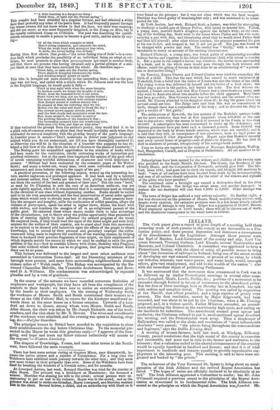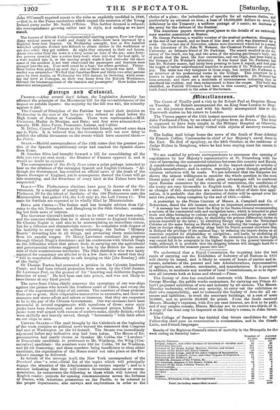IRELAND . The Cork paper gives a report at great length
of a meeting held there' yesterday week of such persons in the county as are favourable to a Pro- tection policy, and deem present depression and distresses a consequence of its abandonment by the Legislature. Amongst those present were, the Earl of Bandon, Lord-Lieutenant of the county and city, Lord Vis- count Bernard, Viscount Carbery, Lord Kinsale, several Honourables and Baronets, and Colonel Chatterton. A committee was appointed to form a Protectionist Society, with the object of using all possible means to bring about "the formation of railways in Ireland; being one of the surest modes of developing our vast natural resources, at present of no value, by which our fisheries, minerals, vast water-power, and waste lands, would, amongst others, give vast employment, and add to the wealth of the nation ": also with the immediate object of petitioning Parliament.
It was announced that the movement tints commenced in Cork was to be followed up by similar Protectionist meetings in several other coun- ties,—Longford, Meath, Lowth, Dublin, &c.; portions of a movement to be extended through Ireland in favour of recurrence to the abandoned policy. But the first of these meetings, held on Monday last at Longford, has met with sudden and complete defeat. The meeting was called by requisition of the Sheriff; that officer presided, and a large number of gentry were present. The first resolution, moved by Major Edgeworth, had been seconded, and was about to be put by the Chairman, when a Mr. Fleming proposed, and, in a violent speech, Father M`Gaven seconded, an amend- ment attributing the distress to the exorbitantly high rents, and calling OD' the landlords for reductions. The amendment created great uproar and confusion: the Chairman refused to put it, amid continued uproar dissolved the meeting, and the Protectionists went away. Then a shopkeeper of Ballymahon was called to the chair, and resolutions of "moat inflammable character" were passed; "the priests being throughout the commandants and fuglemen," says the Dublin Evening Mail.
A meeting of tenant-farmers, held last week at Windgap, Kilkenny County, passed resolutions that the high rental of this county is excessive and intolerable, and must end in ruin to the farmer and starvation to the labourer; that a valuation suited to the altered circumstances of the country would be equally beneficial to landlord and farmer; and that it is of vital importance to landlords and tenants equally to provide reproductive em- ployment to the labouring poor. This meeting is said to have been ori- ginated and backed by "the priests."
The endeavour of the Very Reverend Dr. Spratt to bring about an amal- gamation of the Irish Alliance and the revived Repeal Association has failed. "The hopes of union are officially declared to be absolutely at an end." The Irish Alliance appointed a Committee to confer; but Mr. John O'Connell required a previous assent to the principles of the Repeal Asso- ciation as enunciated in its fundamental rules. The Irish Alliance con- sented to the principles on which the Repeal Association was founded. Mr.
John O'Connell required assent to the rules as explicitly modified in 1846, —that is, to the Peace resolutions which caused the secession of the Young Ireland party under Mr. Smith O'Brien. This further demand is refused; the correspondence growing rather tart in style, and ending as we have Mated.
The horrors of Kilrush Union—thousands:of starving paupers, Poor-law Guar- dians without money or credit and deeply in debt—have been increased by a frightful ferry-boat disaster. On Wednesday sennight, four or five hundred wretched creatures flocked into Miamh to obtain shelter in the workhouse or out-door relief: they got neither. At night they returned to their sad homes. About two miles from the town is a ferry across an inlet of the sea: some forty- five persons crowded into a rotten ferry-boat; when mid-way the boat split, or a wave washed into it, or the moving people made it heel over—for the exact cause of the accident is not very clear—and the passengers and boatmen were plunged into the sea. Four were saved by a boat; the others perished. Thirty-. three bodies were picked up next day ; and on these an inquest was held. This verdict was returned—" We find that Jonathan Brew and thirty-two other persons came by their deaths, on Wednesday the 12th instant, by drowning, while cross- ing the ferry at Comogne, on their way home from the Kikush Workhouse, through the mismanagement of the boatmen and passengers." More bodies were recovered subsequently.



























 Previous page
Previous page